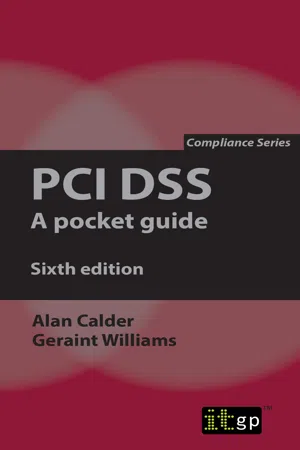
- 58 pages
- English
- ePUB (mobile friendly)
- Available on iOS & Android
PCI DSS: A pocket guide, sixth edition
About This Book
An ideal introduction to PCI DSS v3.2.1
All businesses that accept payment cards are prey for criminal hackers trying to steal financial information and commit identity fraud. The PCI DSS (Payment Card Industry Data Security Standard) exists to ensure that businesses process credit and debit card payments in a way that effectively protects cardholder data.
All organisations that accept, store, transmit or process cardholder data must comply with the Standard; failure to do so can have serious consequences and expensive repercussions. These range from customer desertion and brand damage to significant financial penalties and operating restrictions imposed by their acquiring bank.
Covering PCI DSS v3.2.1, this handy pocket guide provides all the information you need to consider as you approach the Standard. It is also an ideal training resource for those in your organisation involved with payment card processing. Topics include:
- An overview of PCI DSS v3.2.1
- How to comply with the requirements of the Standard
- Maintaining compliance
- The PCI SAQ (self-assessment questionnaire)
- The PCI DSS and ISO 27001
- Procedures and qualifications
- An overview of the PA-DSS (Payment Application Data Security Standard)
- PTS (PIN Transaction Security)
- Software-based PIN entry
Buy your copy of this quick-reference guide to PCI DSS v3.2.1 today!
About the authors
Alan Calder is a leading author on IT governance and information security issues. He is the CEO of GRC International Group plc, the AIM-listed company that owns IT Governance Ltd.
Alan is an acknowledged international cyber security guru. He is a frequent media commentator on information security and IT governance issues, and has contributed articles and expert comment to a wide range of trade, national and online news outlets.
Geraint Williams is the CISO for the GRC International Group of companies, and a knowledgeable and experienced senior information security consultant and former PCI QSA, with a strong technical background and experience in the PCI DSS and security testing.
Geraint has provided consultancy on implementing the PCI DSS, and has conducted audits for a wide range of merchants and service providers as well as penetration testing and vulnerability assessments for clients. He has broad technical knowledge of security and IT infrastructure, including high-performance computing and Cloud computing. His certifications include CISSP® and PCIP.
Frequently asked questions
Information
CHAPTER 1: WHAT IS THE PAYMENT CARD INDUSTRY DATA SECURITY STANDARD (PCI DSS)?
Key definitions4 and acronyms in the PCI DSS
CHAPTER 2: RECENT CARDHOLDER BREACHES
E-commerce breaches
Hospitality industry
CHAPTER 3: WHAT IS THE SCOPE OF THE PCI DSS?
Table of contents
- Cover
- Title
- Copyright
- Foreword
- About the Author
- Acknowledgements
- Contents
- Chapter 1: What is the Payment Card Industry Data Security Standard (PCI DSS)?
- Chapter 2: Recent cardholder breaches
- Chapter 3: What is the scope of the PCI DSS?
- Chapter 4: Compliance and compliance programmes
- Chapter 5: Consequences of a breach
- Chapter 6: How do you comply with the requirements of the Standard?
- Chapter 7: Maintaining compliance
- Chapter 8: PCI DSS – the Standard
- Chapter 9: Aspects of PCI DSS compliance
- Chapter 10: The PCI Self-Assessment Questionnaire (SAQ)
- Chapter 11: Procedures and qualifications
- Chapter 12: The PCI DSS and ISO/IEC 27001
- Chapter 13: The Payment Application Data Security Standard (PA-DSS)
- Chapter 14: PIN Transaction Security (PTS)
- Chapter 15: Secure Software Standard
- Chapter 16: Software-based PIN entry on commercial off-the-shelf devices (COTS)
- Further reading